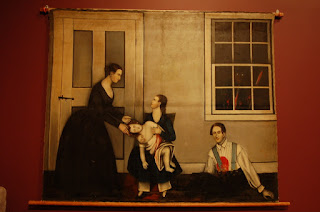I'M SICK; SEND FOR MAGINNIS
“There I stood, nothing but a mere boy, before two officers, a weeping and crying. Horrors, horrors, horrors, eternal horror of horrors came beating and pealting (sic) upon my mind.”- Austin Reed The Life and Adventures of a Haunted Convict
John Philips (convict) sworn:
By WH Seward:
Q. What is the number of your cell?
Declines answering.
Q. Did you know James Gordon?
Declines answering.
Court tells witness time will be added to his sentence for contempt if he does not answer.
Q. Will you answer?
A. I’ll die first.
Lloyd Slade (keeper) sworn:
By WH Seward:
Q. Where and when was Henry Wyatt flogged?
A. I should think it was in the south wing he was flogged. Near as I could tell it was in the fall.
Q. Can you describe the cat?
The Court: What is the object of this line of questioning?
Answered by Seward:
“It is to show that the prisoner has been flogged and tortured with an inhuman instrument of torture, and that the prisoner was driven to desperation and that a homicide was the result.”
Besides the barrel buck, shower bath and the stock box, the cat, spread eagle and iron cap were also readily employed at Auburn. Some of these were still in modern commercial usage in various American prisons, as well as on the slave plantations of the south, and all sprang from the medieval church’s deliciously evil lexicon of “the judas cradle,” “scold’s bridle,” “lead sprinkler,” “Spanish donkey,” “heretic’s fork,” “brazen bull,” “crocodile shears,” and “head crusher.” What year is this?
The now freed, but damaged, William Freeman, had heard that Henry Wyatt was going on trial for murder and didn’t want to miss a moment. He showed up in court every day of the trial hoping he would be given a chance to air his own grievances. The injuries Bill had sustained in prison had not only taken away his hearing, they’d left him severely scarred mentally. At times he was coherent and seemed no different than his old self, while at other times he hung and shook his head rapidly from side to side, mumbled and was completely unresponsive when asked a simple question. The workings of the judicial system were well beyond his grasp in either state.
Somehow in William Freeman’s twisted logic, Henry Wyatt’s trial was all about Martha Godfrey’s stolen horse and how much he would be paid for his time served at Auburn. Everyday he strained to hear the mention of his name or the stolen widow’s horse. Whomever he was sitting next to in court would be elbowed and pushed aside, as Bill looked pleadingly towards the bench for a repeat of what had been just said. It didn’t take long for Freeman to become an annoying distraction to the bailiffs who tried in vain to get him to shut up and sit still.
The twenty-one year old, was a little heavier, a little more hitched up and hunched over that before; sporting a short, scruffy beard and unruly hair. Otherwise, he looked like the same old “Indian Bill.” Freeman reappeared on the streets of New Guinea as suddenly as he had disappeared. He hadn’t been missed when he went away, so how could he be welcomed back? Nobody paid any attention to Bill Freeman. That was about to change.

Comments
Post a Comment